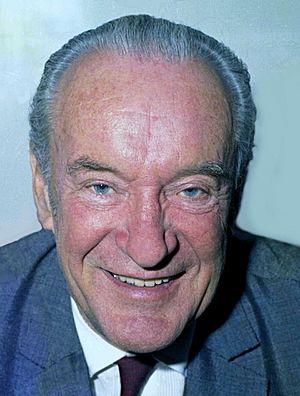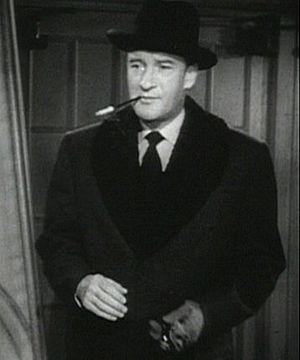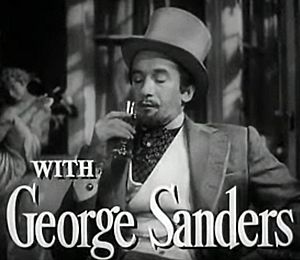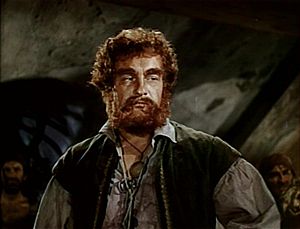George Sanders facts for kids
Quick facts for kids
George Sanders
|
|
|---|---|

Portrait of Sanders by Allan Warren, 1972
|
|
| Born |
George Henry Sanders
3 July 1906 |
| Died | 25 April 1972 (aged 65) |
| Alma mater | Manchester Technical College |
| Occupation |
|
| Years active | 1929–1972 |
| Spouse(s) |
Susan Larson
(m. 1940–1949)Benita Hume
(m. 1959–1967) |
| Partner(s) | Lorraine Chanel (1968–1972; his death) |
| Relatives | Tom Conway (brother) |
George Henry Sanders (born 3 July 1906 – died 25 April 1972) was a British actor and singer. His career lasted for over 40 years! He was known for his deep, smooth voice and an upper-class English accent. This often led him to play sophisticated, sometimes villainous, characters in movies.
You might remember him from many famous films. He was Jack Favell in Rebecca (1940) and Addison DeWitt in All About Eve (1950), for which he won an Oscar. He also played Sir Brian De Bois-Guilbert in Ivanhoe (1952) and even King Richard the Lionheart in King Richard and the Crusaders (1954). Later, he was Mr. Freeze in the Batman TV series (1966) and the voice of Shere Khan in Disney's The Jungle Book (1967). If you like detective stories, he was also famous for playing Simon Templar, known as The Saint, and the clever crimefighter The Falcon.
Contents
Early Life and Education
George Sanders was born on 3 July 1906 in Saint Petersburg, Russian Empire. His father, Henry Sanders, made ropes, and his mother, Margaret, was a gardener. His mother was also born in Saint Petersburg and had German, Estonian, and Scottish family roots.
In 1917, when the Russian Revolution began, George and his family moved to Great Britain. He went to Bedales School and Brighton College, which are schools for boys. After that, he studied at Manchester Technical College. He then worked in textile research.
Later, Sanders traveled to South America and managed a tobacco farm. When times got tough, he returned to Britain. He found a job at an advertising agency. There, a company secretary named Greer Garson, who wanted to be an actress, suggested that he try acting too!
Becoming an Actor
George Sanders learned to sing and got a part in a play called Ballyhoo. It didn't run for long, but it helped him start his acting career. He began working regularly on the British stage, appearing with famous actors like Edna Best.
He even went to New York to perform on Broadway in a play called Conversation Piece in 1934.
Hollywood Films
Some of George Sanders's British films were shown by a big movie company called 20th Century Fox. This company was looking for an actor to play a villain in their Hollywood movie Lloyd's of London (1936). Sanders got the part! His smooth, upper-class English accent and calm, confident manner made him perfect for playing sophisticated characters, often villains. Lloyd's of London was a huge success, and Fox signed Sanders to a long contract.
Playing Famous Characters
Sanders returned to Hollywood, where another studio, RKO, wanted him to play the hero in a series of movies about a character called The Saint. He took over the role for The Saint Strikes Back (1939). In 1940, he also played Jack Favell in Alfred Hitchcock's famous movie Rebecca.
RKO later started a new detective series called The Falcon in 1941, and George Sanders played the main role, Gay Laurence. He played this character in four films. His brother, Tom Conway, later took over the role.
Sanders also starred in a major film called The Moon and Sixpence (1942). He was lent to other studios for films like This Land Is Mine (1943) and Appointment in Berlin (1943). In 1947, he played King Charles II in the movie Forever Amber.
Winning an Oscar

One of George Sanders's most famous roles was as the sharp-tongued theater critic Addison DeWitt in All About Eve (1950). For this amazing performance, he won an Academy Award for Best Supporting Actor.
After this, he continued to play important roles. He signed a deal with MGM and appeared in The Light Touch (1951) and Ivanhoe (1952). In Ivanhoe, he played Sir Brian de Bois-Guilbert, a knight who fights Robert Taylor's character. This movie was a big hit!
Sanders also traveled to Italy to act with Ingrid Bergman in Journey to Italy (1954). He made several more movies for MGM, including Jupiter's Darling (1955) and The King's Thief (1955), where he played King Charles II again.
He starred in the TV series The George Sanders Mystery Theater in 1957. He also worked with Tyrone Power one last time in Solomon and Sheba (1959). Later, he appeared with Peter Sellers in A Shot in the Dark (1964), which was a sequel to The Pink Panther.
Final Films
George Sanders continued acting in the late 1960s. He had a supporting role in John Huston's The Kremlin Letter (1969). In 1969, he announced he was stepping away from acting. His last film roles included Doomwatch (1972) and Endless Night (1972). His very last film was Psychomania (1973).
Writing and Singing
George Sanders also had two crime novels published under his name. They were Crime on My Hands (1944) and Stranger at Home (1946). These books were written by someone else but used his name because he was so famous from his movies.
During the making of The Jungle Book, George Sanders was the voice of Shere Khan. However, he wasn't able to sing the song "That's What Friends Are For" for his character. So, another singer named Bill Lee sang it instead.
Personal Life
George Sanders was married four times. His first wife was Susan Larson, from 1940 to 1949. Then, he married Zsa Zsa Gabor from 1949 to 1954. He even starred with her in the film Death of a Scoundrel (1956).
In 1959, he married Benita Hume. She passed away in 1967. Sadly, his brother Tom Conway also died that same year. George Sanders wrote an autobiography called Memoirs of a Professional Cad in 1960, which was praised for being very clever. His fourth and final marriage was to Magda Gabor in 1970, who was the older sister of his second wife.
Later Years and Passing
In his later years, George Sanders became more private and faced some difficult times, including the deaths of his third wife, his mother, and his brother. He also had some health challenges. He decided to sell his beloved house in Majorca, Spain, which he later regretted.
George Sanders passed away on 25 April 1972, in Castelldefels, a town near Barcelona, Spain.
He has two stars on the Hollywood Walk of Fame to honor his contributions to film and television.
Complete Filmography
- Love, Life and Laughter (1934) as Singer in Public Bar (uncredited)
- Things to Come (1936) as Pilot (uncredited)
- Strange Cargo (1936) as Roddy Burch
- Find the Lady (1936) as Curly Randall
- The Man Who Could Work Miracles (1936) as Indifference
- Dishonour Bright (1936) as Lisle
- Lloyd's of London (1936) as Lord Everett Stacy
- Love Is News (1937) as Count Andre de Guyon
- Slave Ship (1937) as Lefty
- The Lady Escapes (1937) as Rene Blanchard
- Lancer Spy (1937) as Baron Kurt von Rohback / Lt. Michael Bruce
- International Settlement (1938) as Del Forbes
- Four Men and a Prayer (1938) as Wyatt Leigh
- Mr. Moto's Last Warning (1939) as Eric Norvel
- The Outsider (1939) as Anton Ragatzy
- So This Is London (1939) as Dr. de Reseke
- The Saint Strikes Back (1939) as Simon Templar / The Saint
- Confessions of a Nazi Spy (1939) as Schlager
- The Saint in London (1939) as Simon Templar / The Saint
- Nurse Edith Cavell (1939) as Capt. Heinrichs
- Allegheny Uprising (1939) as Capt. Swanson
- The Saint's Double Trouble (1940) as Simon Templar aka The Saint / 'Boss' Duke Bates
- Green Hell (1940) as Forrester
- The House of the Seven Gables (1940) as Jaffrey Pyncheon
- Rebecca (1940) as Jack Favell
- The Saint Takes Over (1940) as Simon Templar / The Saint
- Foreign Correspondent (1940) as Scott ffolliott
- Bitter Sweet (1940) as Baron von Tranisch
- The Son of Monte Cristo (1940) as Gen. Gurko Lanen
- The Saint in Palm Springs (1941) as Simon Templar / The Saint
- Rage in Heaven (1941) as Ward Andrews
- Man Hunt (1941) as Major Quive-Smith
- Sundown (1941) as Coombes
- The Gay Falcon (1941) as Gay Laurence / The Falcon
- A Date with the Falcon (1942) as Gay Laurence / The Falcon
- Son of Fury: The Story of Benjamin Blake (1942) as Sir Arthur Blake
- The Falcon Takes Over (1942) as Gay Lawrence / The Falcon
- Her Cardboard Lover (1942) as Tony Barling
- Tales of Manhattan (1942) as Williams
- The Falcon's Brother (1942) as Gay Lawrence / The Falcon
- The Moon and Sixpence (1942) as Charles Strickland
- The Black Swan (1942) as Capt. Billy Leech
- Quiet Please, Murder (1942) as Jim Fleg
- This Land Is Mine (1943) as George Lambert
- They Came to Blow Up America (1943) as Carl Steelman / Ernst Reiter
- Appointment in Berlin (1943) as Wing Cmdr. Keith Wilson
- Paris After Dark (1943) as Dr. Andre Marbel
- The Lodger (1944) as Inspector John Warwick
- Action in Arabia (1944) as Michael Gordon
- Summer Storm (1944) as Fedor Mikhailovich Petroff
- ...Square (1945) as Dr. Allan Middleton
- The Picture of Dorian Gray (1945) as Lord Henry Wotton
- The Strange Affair of Uncle Harry (1945) as Harry Melville Quincey
- A Scandal in Paris (1946) as Eugène François Vidocq
- The Strange Woman (1946) as John Evered
- The Private Affairs of Bel Ami (1947) as Georges Duroy
- The Ghost and Mrs. Muir (1947) as Miles Fairley
- Lured (1947) as Robert Fleming
- Forever Amber (1947) as King Charles II
- The Fan (1949) as Lord Robert Darlington
- Samson and Delilah (1949) as The Saran of Gaza
- All About Eve (1950) as Addison DeWitt
- Black Jack (1950) as Mike Alexander
- I Can Get It for You Wholesale (1951) as J.F. Noble
- The Light Touch (1951) as Felix Guignol
- Ivanhoe (1952) as De Bois-Guilbert
- Assignment – Paris! (1952) as Nicholas Strang
- Call Me Madam (1953) as General Cosmo Constantine
- Witness to Murder (1954) as Albert Richter
- King Richard and the Crusaders (1954) as King Richard I
- Journey to Italy (Viaggio in Italia) (1954) as Alexander 'Alex' Joyce
- Jupiter's Darling (1955) as Fabius Maximus
- Moonfleet (1955) as Lord Ashwood
- The Scarlet Coat (1955) as Dr. Jonathan Odell
- The King's Thief (1955) as Charles II
- Never Say Goodbye (1956) as Victor
- While the City Sleeps (1956) as Mark Loving
- That Certain Feeling (1956) as Larry Larkin
- Death of a Scoundrel (1956) as Clementi Sabourin
- The Seventh Sin (1957) as Tim Waddington
- Rock-A-Bye Baby (1958) as Danny Poole (1959) (scenes cut)
- The Whole Truth (1958) as Carliss
- From the Earth to the Moon (1958) as Stuyvesant Nicholl
- That Kind of Woman (1959) as A.L.
- Solomon and Sheba (1959) as Adonijah
- A Touch of Larceny (1960) as Sir Charles Holland
- The Last Voyage (1960) as Captain Robert Adams
- Bluebeard's Ten Honeymoons (1960) as Henri Landru
- Cone of Silence (1960) as Sir Arnold Hobbes
- Village of the Damned (1960) as Gordon Zellaby
- The Rebel (aka, Call Me Genius, 1961) as Sir Charles Brewer
- Five Golden Hours (1961) as Mr. Bing
- Le Rendez-vous (1961) as J.K. / Kellermann
- Operation Snatch (1962) as Maj. Hobson
- In Search of the Castaways (1962) as Thomas Ayerton
- Cairo (1963) as The Major
- The Cracksman (1963) as Guv'nor
- Dark Purpose (1964) as Raymond Fontaine
- The Golden Head (1964) as Basil Palmer
- A Shot in the Dark (1964) as Benjamin Ballon
- Last Plane to Baalbeck (1965) as Prince Makowski
- The Golden Head (1965) as Basil Palmer
- The Amorous Adventures of Moll Flanders (1965) as The Banker
- Trunk to Cairo (1965) as Professor Schlieben
- The Quiller Memorandum (1966) as Gibbs
- Witchdoctor in Tails as the narrator (1966)
- Warning Shot (1967) as Calvin York
- Good Times (1967) as Mordicus / Knife McBlade / White hunter / Zarubian
- The Jungle Book (1967) as Shere Khan, the Tiger (voice)
- Laura (1968 TV movie) as Waldo Lydecker
- King of Africa (1968) as Captain Walter Phillips
- The Candy Man (1969) as Sidney Carter
- The Girl from Rio (1969) as Masius
- The Body Stealers (1969) as General Armstrong
- The Best House in London (1969) as Sir Francis Leybourne
- The Kremlin Letter (1970) as Warlock
- Rendezvous with Dishonour (1970) as General Downes
- Doomwatch (1972) as The Admiral – Sir Geoffrey
- Endless Night (1972) as Andrew Lippincott
- Psychomania (1973) as Shadwell (final film role)
Television Roles
- Screen Directors Playhouse (1956) as Charles Ferris / Baron
- Ford Star Jubilee "You're the Top" (1956)
- The George Sanders Mystery Theater (1957)
- What's My Line? 15 September 1957 (Episode No. 380) (season 9, episode 3) Mystery Guest
- The Rogues (1965) as Leonard Carvel
- Voyage to the Bottom of the Sea "The Traitor" (1965) as Fenton
- The Man From U.N.C.L.E. "The Gazebo in the Maze Affair" and "The Yukon Affair" (1965) as G. Emory Partridge
- Daniel Boone (1966) as Col. Roger Barr
- Batman (1966) as Mr. Freeze
- Mission: Impossible - The Merchant (1971) as Armand Anderssarian
Broadway Shows
- Conversation Piece, at the 44th Street Theatre, 1934
See also
 In Spanish: George Sanders para niños
In Spanish: George Sanders para niños
 | Laphonza Butler |
 | Daisy Bates |
 | Elizabeth Piper Ensley |



